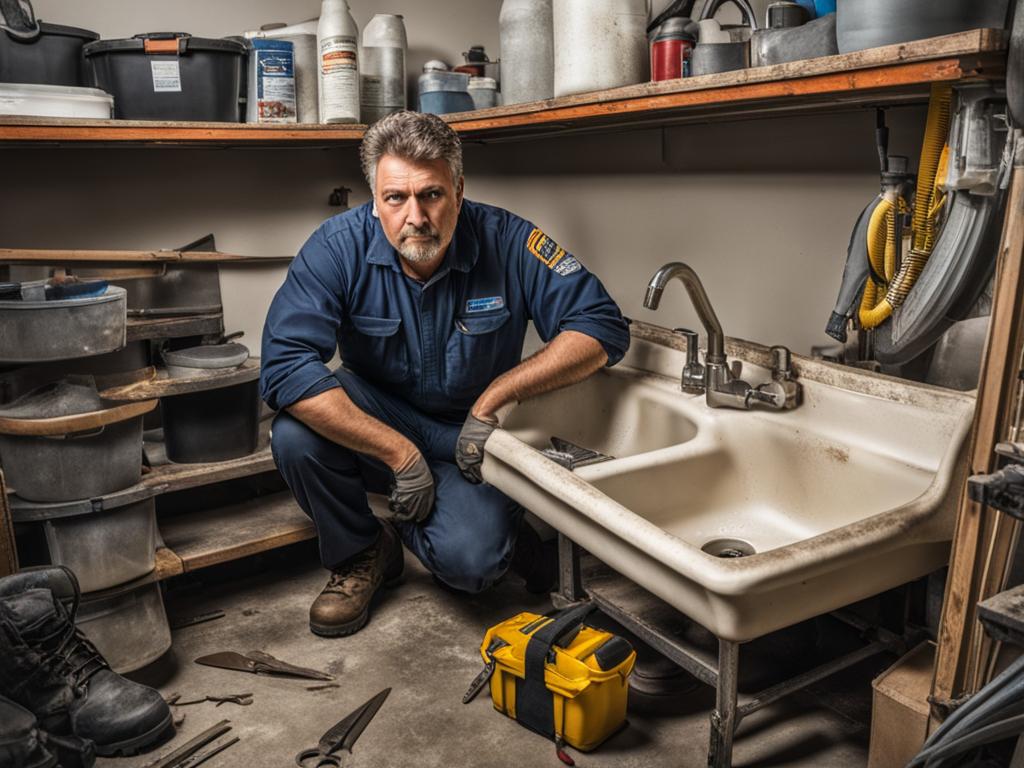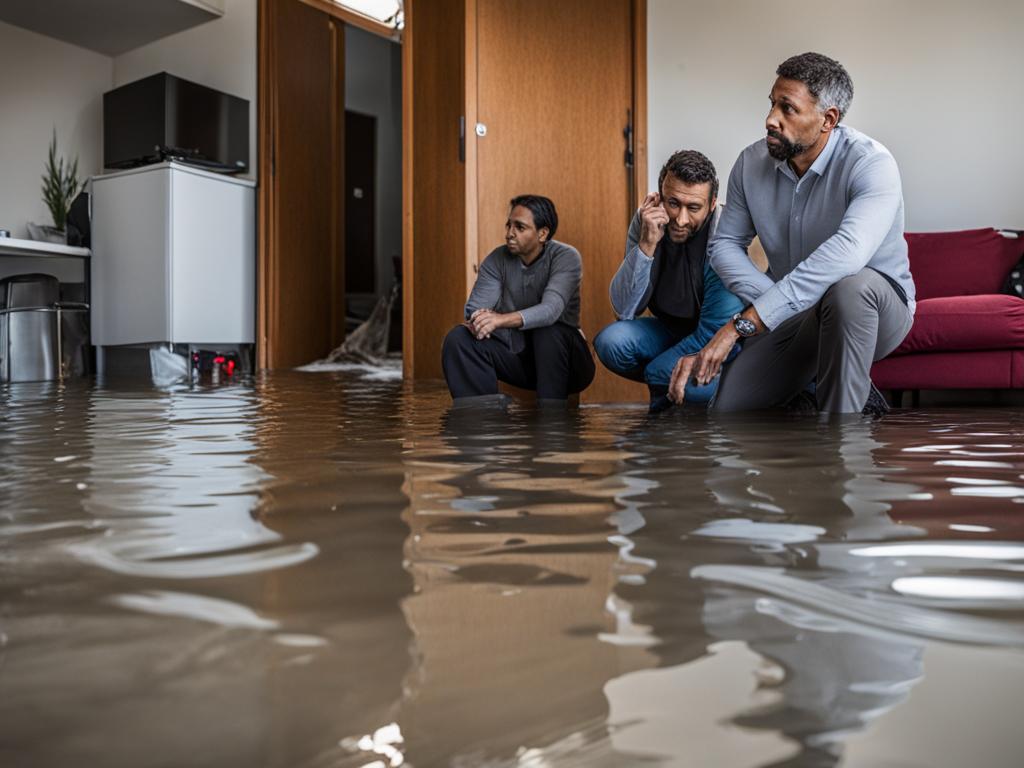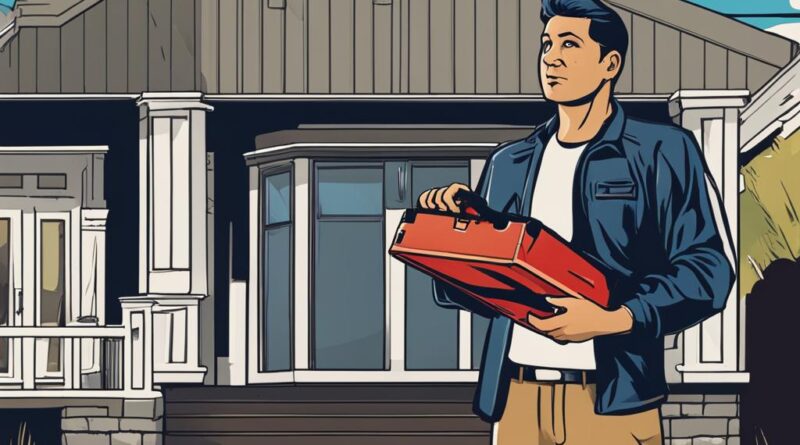Do Property Managers Pay for Repairs? Find Out Here!
When it comes to repairs in rental properties, understanding the responsibilities of property managers is crucial. Property management companies play a significant role in handling repair requests from tenants and ensuring that maintenance issues are promptly resolved. Let’s explore the topic of property management repair costs and the responsibilities that property managers have when it comes to repairs.
Key Takeaways:
- Property managers typically coordinate repairs, hire contractors, and address maintenance issues promptly.
- Property owners generally bear the financial responsibility for repairs, but costs can be covered through a reserve fund set up by property management companies.
- Property managers handle repairs by working with contractors or their own maintenance staff.
- Timely repairs in rental properties help maintain the property’s value and enhance tenant satisfaction.
- Tenants have certain responsibilities for minor repairs, while property managers handle major repairs and emergency situations.
Who Pays for Repairs in Rental Properties?
When it comes to repairs in rental properties, it’s important to understand the responsibilities and financial implications. In most cases, property owners are responsible for paying for repairs. However, when a property management company is involved, the costs are often covered by the property owner through a reserve fund.
The property management company takes care of coordinating the repairs and hiring contractors, but the ultimate financial responsibility lies with the property owner. This allows property owners to have peace of mind knowing that repairs are being handled efficiently and in a timely manner.
Property managers play a significant role in the repair process. They act as the middleman between the tenants and property owners, ensuring that repair requests are addressed promptly and that the necessary repairs are completed. By handling the coordination and oversight of repairs, property managers alleviate the burden from property owners and ensure that the rental property remains well-maintained.
The Role of Property Managers in Repair Expenses
Property managers have a crucial role in managing repair expenses. They are responsible for assessing maintenance needs, setting aside funds in the reserve account, and allocating those funds to cover the costs of repairs. Their expertise in property management ensures that repairs are addressed promptly and within budget.
| Responsibilities of Property Managers | Responsibilities of Landlords |
|---|---|
| Coordinating repair requests from tenants | Approving repair expenses |
| Hiring and overseeing contractors | Providing necessary funds for repairs |
| Maintaining a reserve fund for repair costs | Ensuring repairs are completed |
| Communicating with tenants about repair updates | Monitoring repair progress |
With their knowledge and experience in property management, property managers play a pivotal role in ensuring that repairs are handled efficiently and that the rental property remains in good condition. By facilitating communication, overseeing repairs, and managing repair expenses, property managers contribute to a positive and hassle-free rental experience for both property owners and tenants.
How Do Property Managers Handle Repairs?
Property managers play a crucial role in maintaining the condition of rental properties. They are responsible for handling repairs and ensuring that maintenance issues are promptly addressed. Here’s a closer look at the responsibilities of property managers when it comes to repairs.
Coordinating Repairs
Property managers are in charge of coordinating repairs for rental properties. When a repair request is received from a tenant, the property manager assesses the issue and determines the best course of action. They have a network of reliable contractors and vendors that they can call upon to carry out the necessary repairs. Property managers ensure that the repairs are scheduled and completed in a timely manner, minimizing any inconvenience for the tenants.
Maintenance Tasks
In addition to addressing repair requests, property managers also take care of scheduling regular maintenance tasks. This includes things like cleaning the common areas, landscaping, and conducting routine inspections to identify any potential issues. By staying proactive with maintenance, property managers can prevent minor problems from escalating into major repair issues.
Managing Repair Expenses
Property managers are responsible for managing repair expenses within the allocated budget. They keep track of repair costs and allocate funds from the reserve fund as needed. This ensures that there are sufficient funds available to cover both routine maintenance and unexpected repairs. Property managers work closely with property owners to discuss repair expenses and make informed decisions regarding budget allocation.

Overall, property managers play a vital role in ensuring that repairs are handled efficiently and effectively in rental properties. Their expertise in coordinating repairs, managing maintenance tasks, and allocating repair funds helps to maintain the condition and value of the property while providing a safe and comfortable living environment for tenants.
Benefits of Timely Repairs in Rental Properties
Timely repairs in rental properties offer numerous benefits to both property owners and tenants. By addressing maintenance issues promptly, property managers can ensure the smooth functioning and longevity of the property, saving on future repair costs and maintaining tenant satisfaction. Here are some key benefits of making quick repairs:
1. Cost Savings
Maintaining a rental property in good condition significantly reduces the risk of major issues developing over time. By promptly addressing minor repairs, property managers can prevent them from escalating into more expensive and extensive problems. This proactive approach can save property owners from incurring significant costs down the line.
2. Tenant Retention
Timely repairs contribute to tenant satisfaction and increase the likelihood of lease renewals. When repairs are quickly addressed, tenants feel valued and taken care of. They are more likely to stay in a well-maintained property, reducing turnover rates and minimizing the need for costly advertising and tenant acquisition efforts.
3. Property Value Preservation
Regular maintenance and prompt repairs help preserve the value of the rental property. A property that is well-maintained and free from significant defects will have higher market value and appeal to potential tenants or buyers. Keeping the property in good condition also helps to comply with building codes and regulations, avoiding potential legal issues.
By focusing on timely repairs, property managers can effectively manage maintenance costs, enhance tenant satisfaction, and protect the long-term value of rental properties.
Property Managers and Contractors
Property management companies rely on a network of reliable contractors to handle repairs in rental properties. These companies often have a carefully curated list of contractors they have worked with in the past, ensuring that they can quickly find and hire professionals for the job. Having this contact list of contractors allows property managers to efficiently address repair requests from tenants and ensure that maintenance issues are promptly resolved.
When it comes to finding reliable repair contractors, property management companies prioritize those who have a proven track record of delivering high-quality workmanship and excellent customer service. They look for contractors who are licensed, insured, and experienced in handling various types of repairs. By relying on trusted contractors, property managers can confidently delegate repair tasks, knowing that they will be completed to a high standard.
In addition to having a list of reliable contractors, property management companies may also have their own maintenance crew. This allows them to handle minor repairs and maintenance tasks in-house, reducing the need to outsource every repair job. By having a skilled maintenance crew, property managers can quickly address small issues and minimize the overall cost of repairs.
| Benefits of Property Managers and Contractors | Benefits of Property Management Crew |
|---|---|
| Access to a network of reliable contractors | In-house handling of minor repairs |
| Efficient coordination of repair requests | Prompt response to maintenance issues |
| Ensuring high-quality workmanship | Reduced reliance on external contractors |
| Minimizing repair costs | Cost-effective maintenance solutions |
In summary, property management companies have extensive contact lists of reliable contractors to handle repairs in rental properties. They prioritize contractors with a proven track record and may also have their own maintenance crew for minor repairs. This allows property managers to efficiently address repair requests and ensure that maintenance issues are promptly resolved, benefiting both property owners and tenants.
Tenant Responsibilities for Repairs
Tenants have certain responsibilities when it comes to repairs in rental properties. While property managers are primarily responsible for coordinating and addressing maintenance issues, tenants play a role in maintaining the property’s condition. It is important for tenants to understand their responsibilities and promptly report any necessary repairs to the property manager.
Minor repairs resulting from normal wear and tear are typically the responsibility of the tenant. This includes tasks such as replacing light bulbs, unclogging drains, or fixing loose cabinet hinges. Tenants should also ensure that they are keeping the property clean and in good condition, as neglect or damage caused by the tenant may result in repair costs.
When it comes to major repairs or emergency situations, tenants should notify the property manager immediately. These may include issues such as plumbing leaks, electrical problems, or structural damage. Prompt reporting of such repairs is crucial to prevent further damage and ensure the safety and habitability of the rental property.

Tenant Responsibilities for Repairs
1. Report minor repairs promptly: Tenants should promptly report any minor repairs resulting from normal wear and tear to the property manager. This includes tasks such as replacing light bulbs or fixing minor plumbing issues.
2. Keep the property clean and well-maintained: Tenants are responsible for maintaining the cleanliness and general upkeep of the rental property. This includes tasks such as regular cleaning, yard maintenance, and proper disposal of garbage.
3. Notify the property manager of major repairs or emergencies: In the case of major repairs or emergency situations, such as burst pipes or electrical failures, tenants should immediately notify the property manager. This allows for swift resolution and ensures the safety and habitability of the rental property.
Property Management and Maintenance Expenses
Property management companies play a crucial role in handling repairs and maintenance in rental properties. As part of their responsibilities, they allocate funds for these expenses through a reserve fund. This fund is used to cover the costs of repairs as they arise, ensuring that the property remains well-maintained and in good condition.
In terms of property management repair costs, the allocation of funds is an important consideration. Property management companies assess the property’s needs and set aside an appropriate amount in the reserve fund. Property owners may have a say in the amount allocated and can monitor and control expenses beyond the designated costs.
To provide a comprehensive understanding of repair expenses, it is helpful to present the data in a table:
| Description | Estimated Cost |
|---|---|
| Plumbing repairs | $500 – $1,000 |
| Electrical repairs | $200 – $500 |
| Appliance replacements | $300 – $1,500 |
| Painting and touch-ups | $200 – $800 |
| General maintenance | $100 – $500 |
This table provides an overview of the estimated costs for common repairs and maintenance tasks in rental properties. Keep in mind that these costs may vary depending on factors such as the location of the property and the extent of the repairs needed.
By allocating funds for repairs and maintenance, property management companies ensure that the necessary expenses are covered in a timely manner. This not only helps to maintain the value of the rental property but also contributes to tenant satisfaction by providing a well-maintained living environment.
The Legal Responsibilities of Property Managers for Repairs
Property managers have important legal obligations when it comes to repairs in rental properties. These responsibilities are in place to ensure the habitability and quality of the property, as well as the safety and well-being of tenants. Understanding these obligations is crucial for property managers to effectively carry out their role in managing repairs.
One of the primary legal responsibilities of property managers is to address repairs that affect the habitability of the property. This includes addressing issues such as plumbing problems, electrical faults, and structural damage. Property managers should promptly respond to repair requests from tenants and take appropriate action to resolve the issues.
The warranty of habitability is a key legal concept that property managers must uphold. This warranty implies that rental properties must meet certain minimum standards of habitability, such as providing adequate heating, hot water, and functioning electrical systems. Property managers are responsible for ensuring that these standards are met and maintained throughout the duration of the tenancy.

Additionally, property managers are required to document repair requests and maintain a record of the actions taken to address them. This documentation helps to ensure transparency in the repair process and serves as evidence of the property manager’s compliance with their legal obligations.
In summary, property managers have legal responsibilities to maintain the habitability and quality of rental properties. By promptly addressing repair requests and upholding the warranty of habitability, property managers contribute to the overall satisfaction and well-being of tenants.
Remedies for Unresolved Repairs
When property managers fail to address repairs in a timely manner, tenants have certain remedies available to them. It is important for tenants to understand their rights and the options they have to resolve unresolved repair issues. Tenant-landlord laws provide guidance on the appropriate steps tenants can take to address these situations.
One remedy available to tenants is the repair and deduct option. This allows tenants to arrange for repairs themselves and deduct the cost from their rent payment. However, it is crucial for tenants to follow specific procedures outlined in the local tenant-landlord laws to ensure the legitimacy of this remedy.
Another option for tenants is the abandonment remedy. If the repair issue significantly impacts the tenant’s ability to live in the property, they may choose to terminate the lease agreement. This remedy should be exercised with caution, as it may have legal implications. Tenants should consult local tenant-landlord laws and seek legal advice if they are considering this option.
“Tenants have the right to a safe and habitable living environment. If property managers fail to address necessary repairs, tenants should familiarize themselves with their legal remedies to protect their rights.” – Tenant Advocate Group
Rent withholding is another remedy allowed by law for severe repair issues. In some jurisdictions, tenants have the right to withhold rent until the repair is resolved. It is important for tenants to thoroughly research the specific laws in their area and follow the proper procedures to exercise this remedy.
Table: Comparison of Tenant Remedies for Unresolved Repairs
| Remedy | Description | Procedure |
|---|---|---|
| Repair and Deduct | Tenants arrange for repairs and deduct the cost from rent | Follow local tenant-landlord laws on notification and documentation |
| Abandonment | Tenants terminate the lease due to significant repair issues | Consult local laws and seek legal advice for proper termination process |
| Rent Withholding | Tenants withhold rent until the repair is resolved | Research local laws and follow proper procedures for rent withholding |
Importance of Open Communication
Open communication between property managers and tenants is crucial for maintaining the overall well-being of the rental property. By fostering a transparent and responsive communication channel, property managers can promptly address repair requests and ensure the prompt resolution of maintenance issues. In turn, this helps to create a safe and comfortable living environment for all tenants.
Tenants should report repair issues promptly to the property manager, including emergency situations that require immediate attention. By promptly notifying property managers of any necessary repairs, tenants can ensure that the issues are quickly addressed and resolved. This helps to prevent minor problems from escalating into more significant and costly repairs down the line.
Property managers, on their part, need to actively listen to tenants’ repair requests and take them seriously. They should maintain transparency and communicate openly with tenants, providing updates on the progress of repairs and addressing any concerns or questions that may arise. By doing so, property managers can build trust with tenants and establish a positive landlord-tenant relationship.
The Benefits of Open Communication
Open communication between property managers and tenants brings several benefits. Firstly, it allows property managers to proactively address repair requests, ensuring the prompt resolution of maintenance issues. This, in turn, helps to maintain the property’s value and prevent the deterioration of its condition.
Secondly, open communication fosters tenant satisfaction. When property managers are responsive and attentive to repair requests, tenants feel valued and supported. This contributes to a positive living experience and increases the likelihood of lease renewals.
In summary, open communication between property managers and tenants is vital for promptly addressing repairs and maintaining the overall well-being of the rental property. By maintaining transparent and responsive communication channels, property managers can foster positive landlord-tenant relationships, ensure swift resolution of maintenance issues, and create a safe and comfortable living environment for all tenants.

Conclusion
Property managers play a crucial role in the repair responsibilities of rental properties. They are responsible for coordinating with contractors, overseeing maintenance tasks, and ensuring that repairs are completed promptly. The role of property managers is important in maintaining the value of the property and ensuring tenant satisfaction.
Timely repairs are of utmost importance in rental properties. Swiftly addressing maintenance issues increases the likelihood of tenant lease renewals and prevents minor issues from becoming more expensive problems in the future. Regular maintenance and quick repairs also contribute to the overall well-being of the rental property.
Effective communication between property managers and tenants is key to successfully managing repairs. Tenants should promptly report any necessary repairs, including emergency situations, to ensure swift resolution. Property managers should actively address repair requests, maintaining transparency and creating a safe and comfortable living environment for all tenants.
FAQ
Do property managers pay for repairs?
Property managers typically coordinate repairs and handle the hiring of contractors, but the ultimate financial responsibility lies with the property owner.
Who pays for repairs in rental properties?
In most cases, property owners are responsible for paying for repairs in rental properties. However, property management companies may cover the costs through a reserve fund set up by the property owner.
How do property managers handle repairs?
Property managers coordinate repairs by hiring contractors and ensuring that maintenance issues are promptly addressed. They may have their own maintenance staff or a list of reliable contractors to work with.
What are the benefits of timely repairs in rental properties?
Timely repairs increase the likelihood of tenant lease renewals, prevent minor issues from becoming more expensive problems, maintain the value of the rental property, and ensure tenant satisfaction.
How do property managers find reliable contractors?
Property managers often have existing contacts with reliable repair contractors. They may have a list of contractors they have worked with in the past or even have their own maintenance staff.
What are the tenant responsibilities for repairs?
Tenants are responsible for fixing small issues resulting from normal wear and tear, such as replacing light bulbs or unclogging drains. They should promptly report necessary repairs to the property manager.
How are maintenance expenses allocated in property management?
Property management companies typically allocate funds for repairs and maintenance through a reserve fund. The property owner may have a say in the amount allocated and can monitor and control expenses beyond the designated costs.
What are the legal responsibilities of property managers for repairs?
Property managers have legal obligations to maintain the habitability and quality of rental properties. They are responsible for addressing repairs that affect the habitability of the property.
What remedies do tenants have for unresolved repairs?
If property managers fail to address repairs, tenants may have remedies such as the repair and deduct remedy, abandonment remedy, or rent withholding, depending on the severity of the repair issue.
How important is open communication between property managers and tenants?
Open communication is essential for promptly addressing repairs and maintaining the overall well-being of the rental property. Tenants should report repairs promptly, and property managers should actively address repair requests.

